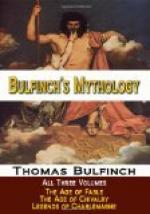Astolpho was amazed at all this, and asked his guide to explain it. He replied, “The old man is Time. All the names upon the tickets would be immortal if the old man did not plunge them into the river of oblivion. Those clamorous birds which make vain efforts to save certain of the names are flatterers, pensioners, venal rhymesters, who do their best to rescue from oblivion the unworthy names of their patrons; but all in vain; they may keep them from their fate a little while, but ere long the river of oblivion must swallow them all.
“The swans, that with harmonious strains carry certain names to the temple of Eternal Memory, are the great poets, who save from oblivion worse than death the names of those they judge worthy of immortality. Swans of this kind are rare. Let monarchs know the true breed, and fail not to nourish with care such as may chance to appear in their time.”
THE WAR IN AFRICA
When Astolpho had descended to the earth with the precious phial, St. John showed him a plant of marvellous virtues, with which he told him he had only to touch the eyes of the king of Abyssinia to restore him to sight. “That important service,” said the saint, “added to your having delivered him from the Harpies, will induce him to give you an army wherewith to attack the Africans in their rear, and force them to return from France to defend their own country.” The saint also instructed him how to lead his troops in safety across the great deserts, where caravans are often overwhelmed with moving columns of sand. Astolpho, fortified with ample instructions, remounted the Hippogriff, thanked the saint, received his blessing, and took his flight down to the level country.
Keeping the course of the river Nile, he soon arrived at the capital of Abyssinia, and rejoined Senapus. The joy of the king was great when he heard again the voice of the hero who had delivered him from the Harpies. Astolpho touched his eyes with the plant which he had brought from the terrestrial paradise, and restored their sight. The king’s gratitude was unbounded. He begged him to name a reward, promising to grant it, whatever it might be. Astolpho asked an army to go to the assistance of Charlemagne, and the king not only granted him a hundred thousand men, but offered to lead them himself.




